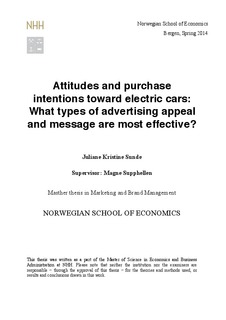Attitudes and purchase intentions toward electric cars : what types of advertising appeal and message are most effective?
Abstract
This master thesis aimed to investigate the relative effectiveness of rational and emotional
advertisement appeals, combined with or without a non-environmental message, in
producing positive attitudes and purchase intentions towards electric cars. The combination
of these two dimensions resulted in four different ad types, which are compared on their
ability to influence attitudes and purchase intentions. The results of the study can provide
managers with a better understanding of the factors affecting an advertisement’s ability to
influence attitudes, as well as guidelines for how an advertisement should be designed when
targeting a particular segment of consumers, taking these factors into account.
By combining theory from the fields of consumer psychology and environmental psychology
with the consumer marketing and advertising literature, two research models were
elaborated. The first model aimed to structure the relationships between advertisement type,
attitudes and purchase intentions, and was based on the Theory of Planned Behaviour as the
underlying theoretical framework. The second model aimed to structure the factors
moderating the relationship between advertisement type and attitudes. To test the two
models, a quantitative study was conducted through means of an online survey-based
experiment, collecting responses from 273 students at the Norwegian School of Economics.
The results show that the two emotional ads are more effective than the two rational ads
when it comes to producing positive attitudes toward the ad. Similarly, the emotional ad with
an additional message also produces more positive attitudes toward the ad in comparison to
the rational ad with an additional message. However, the results show that when the
moderating factors are taken into account, the relative effectiveness of the different ad types
in producing a positive attitude toward the product category depends on consumers
involvement with the product category, pro-environmental self-identity and perceived
inconvenience of driving electric cars (the latter was just partially supported however). The
results also show that the effectiveness of ad type in producing a positive attitude toward the
car model depends on perceived inconvenience, previous experience with electric cars and
gender.
